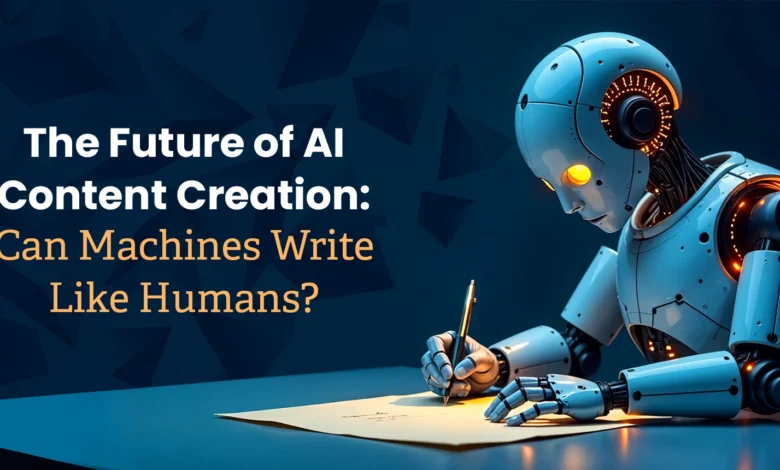
For years, content creation has relied on human research, instinct, emotions, and creativity. But there has been a sudden and massive shift as artificial intelligence (AI) entered the picture. It has changed the way of writing, designing, storytelling, and other content related work that was once reserved for humans.
These AI tools enable machines to generate, write, edit, and structure content, from writing blogs to generating images, with minimal human intervention.
Which is why several marketing teams have integrated AI into their workflows and use AI-powered tools on a regular basis. These tools offer faster content deliveries, organized structures, and increased productivity among human content creators.
But even with advanced algorithms capable of mimicking human writing, one question that keeps coming up is: can AI truly write like a human?
Today we are here to break down where AI content creation stands, how it is complementing human writing, and what the future holds for human writers.
The Role of AI in Enhancing Content Creativity
Content creation isn’t just about writing words on a page; it’s about blending words with creativity, logical narratives, engaging readers, and adding value to what’s already out there.
AI tools have started playing an important role in this space by helping in brainstorming ideas, creating content structures, editing, and even visual content production.
Many content teams and writers now rely on AI-driven platforms like ChatGPT, Gemini, and Claude for generating blog titles, social media captions, and campaign outlines.
AI-generated content is already changing industries like publishing, e-commerce, and entertainment, bringing in speed and efficiency along with a human touch.
Beyond writing, AI is also contributing to creative elements like:
- Image generation
- Video editing suggestions
- Audience sentiment analysis
While AI isn’t capable of bringing that human touch to content, it’s making content creation faster and easier and complementing the human writers.
The Advantages of AI in Content Creation
With AI, humans can break down long, complex case studies into a 5-minute video script in seconds. This is one of the benefits that AI brings to content creation. Let’s look at some of the more notable advantages of AI tools.
Speed and Efficiency
One big change that AI brings to content creation is its speed and work efficiency. How long does it take for a writer to write a research-based 1000-word blog? At least 2 hours. For AI? A few minutes at best!
Yes, AI can produce content much faster than humans can write. From blog posts to social media captions to video scripts, AI speeds up the whole process and helps marketers and creators push their limits ahead of the competition. This technology is continually evolving, with advancements such as the human digital twin emerging to further personalize and automate content creation at scale.
Cost Effectiveness
When AI reduces the time, it also reduces the costs associated with it. Traditionally, content creation often requires a team of writers, editors, and designers. With AI, many of these tasks are now automated, thus cutting down the need for big teams.
Creators can now rely on AI to handle repetitive tasks, and businesses can allocate resources for other important tasks accordingly. This helps creators to focus on more high-level creative strategies or other specialized tasks that require human expertise.
Data Driven Insights
AI’s ability to review and process massive data is well known. It can generate insights and create highly personalized content for specific audiences.
They can analyze customer behavior, search intent, engagement patterns, and what’s trending, and generate content that matches these requirements. This in-depth analysis and recommendations by AI help writers and creators to make informed decisions about content topics, language style, and formats.
The accuracy and insights that AI brings are one of the biggest reasons it’s becoming a crucial part of modern content marketing and creation strategies.
Adding a Flair to Visual and Creative Arts
AI is not limited to just content; it has entered the space of visual arts and design. It is now assisting artists and designers to experiment with different styles and techniques to create unique visuals that were once difficult or time-consuming to achieve.
From creating intricate patterns to designing graphics, AI tools have given a flair to artists’ creativity. When it comes to video production, AI can generate scripts, edit video clips, and even integrate subtitles, music, and smooth transitions.
It enhances efficiency and allows creators to focus on highly creative decisions, while opening the doors for more creative freedom.
Enhance Writing and Storytelling
AI’s use goes beyond the visual and auditory space towards writing and storytelling. Language models are now capable of understanding prompts’ context, tone, and style, which helps in writing exactly how the writer wants.
From generating text snippets and suggesting narrative direction to proofreading and editing support, AI is transforming the whole writing process.
This technology allows writers to go down new narrative paths, refine their ideas, and streamline their editing work rather than replacing human creativity. AI pushes the creative process, driving richer and more engaging stories.
The Limitations and Concerns of AI in Content Creation
While AI has made some remarkable changes in supporting content creation, it still faces a lot of challenges that can limit its creative potential and reliability. Let’s look at some of the key concerns:
Absence of Genuine Emotion and Human Touch
AI can mimic language patterns and tone, but it often lacks the emotional depth and human touch that human writers bring to their work. Content created by machines is good, but it can lack the personal and storytelling elements that drive or hook a reader.
A study conducted by the Reuters found that only 27% of global audiences feel comfortable with news content produced solely by AI.
Originality Remains a Challenge
AI generates content based on its memory. It includes patterns, existing data, and previously published material. This means it faces issues producing truly original ideas, perspectives, or narratives.
While it’s capable of repurposing or restructuring content, making it innovative and humanly creative still remains in the hands of human writers.
Ethical Questions and Transparency Issues
Since everyone is now aware of AI tools, most of the content produced today is AI-generated. This leads to more common and bland content, raising ethical concerns around authorship, transparency, and accountability.
- Should AI-produced content be disclosed to readers?
- Who owns the rights to AI-generated work?
- How do we prevent misuse or misinformation?
These questions are often raised and remain unresolved.
Plagiarism and Data Privacy Risks
Another concern is AI’s tendency to unintentionally copy existing ideas, increasing the risk of plagiarism. The generators pull data from massive resources, and without careful human oversight, there’s a chance of copied phrases and unoriginal work.
Moreover, AI tools that process large amounts of data may compromise privacy if sensitive information is not managed properly or sources are used without consent.
The Relationship Between AI and Humans
As AI tools become more crucial in content creation, the question that comes up is whether these machines will replace creators or how they can collaborate.
AI isn’t here to take over creative jobs; it’s here to complement them while collaborating with humans to produce smarter, faster, and sharper insights.
AI as a Creative Collaborator
Rather than viewing AI as competition, it’s important for writers, designers, and marketers to treat it as a creative partner. AI handles repetitive and time-consuming tasks like creating outlines, summarizing data, or ideating creative. This frees up human resources to focus on strategy and meaningful engagement.
Why Human Oversight Still Matters
While AI is smart and efficient, it lacks context, awareness, and emotional depth. Human creators bring in-depth review, empathy, and ethical judgment to the content that AI tools cannot match.
Final decisions about the tone, structure, and audience connection still rely on human expertise. Most organizations now are adopting hybrid workflows where AI assists in content production but maintains the final control. This combination of speed from AI and insights from humans results in unbeatable content that is both efficient and empathetic.
According to Salesforce, 64% of marketers currently use AI tools to support their content creation process, but 92% still rely on human oversight for final editing and approvals.
Future of AI in Content Creation
The discussion around AI in content is in rounds. As generative models become more important in content creation, businesses are rethinking how they produce, scale, and personalize content. But it still focuses on ethics, originality, and human relevance.
Smarter, More Context-Aware AI
Future AI tools won’t just follow prompts, they’ll understand brand voice, crucial data, and audience preferences with much more accuracy.
AI is already getting better at interpreting tone, intent, and multilingual needs, making it a valuable tool for global content teams. This means faster, relevant, and culturally sensitive content.
Greater Personalization at Scale
One of AI’s most anticipated capabilities is hyper-personalization. They can analyze customer behavior, preferences, and engagement patterns. With this approach, AI will help brands deliver personalized and more unique content for different audiences and even down to individual users.
According to Number Analytics, personalized AI-driven content can increase audience engagement by up to 80% compared to generic campaigns.
Ethical Standards and Regulation Will Tighten
AI-generated content comes with questions about misinformation, plagiarism, and accountability. Experts predict stricter regulations and clear disclosure norms for AI-created content.
57% of professionals worry about AI-generated misinformation, making ethical guidelines and transparency necessary as the technology advances.
AI Won’t Replace Creativity, It’ll Upgrade It
While AI does most of the heavy lifting of data processing and routine tasks, the heart of creativity will always remain a human trait. Writers, designers, and strategists will grow into AI managers, refining and adding emotional depth to the machine-generated work.
Final Thoughts on How AI is Changing Content Creation
The power of AI tools is undeniable. They offer new and higher levels of speed, effectiveness, and personalization. From automating routine tasks to assisting in design and storytelling, the role of the machine has moved beyond mere collaboration.
However, the future lies in a balanced approach between AI and humans to handle the groundwork and human expertise that produces both efficient and manageable content.
Machines may generate content, but humans will always have the advantage in defining its purpose.


